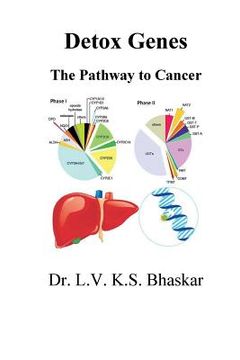Share
Detox Genes: The Pathway to Cancer (in English)
Bhaskar L. V. K. S.
(Author)
·
Createspace Independent Publishing Platform
· Paperback
Detox Genes: The Pathway to Cancer (in English) - L. V. K. S., Bhaskar
$ 4.25
$ 5.38
You save: $ 1.13
Choose the list to add your product or create one New List
✓ Product added successfully to the Wishlist.
Go to My WishlistsIt will be shipped from our warehouse between
Tuesday, June 25 and
Wednesday, June 26.
You will receive it anywhere in United States between 1 and 3 business days after shipment.
Synopsis "Detox Genes: The Pathway to Cancer (in English)"
Biotransformation is the metabolic conversion of endogenous and xenobiotic chemicals to more water-soluble compounds. Xenobiotic biotransformation is accomplished by a limited number of enzymes with broad substrate specificities. Liver is considered to be the main center of detoxification. The result of biotransformation in most cases is detoxification; nevertheless, metabolism of some xenobiotics produces metabolites more reactive than their substrate compound and leads to harmful changes. The biotransformation system involves several enzyme systems that are commonly divided into two phases. Phase I enzymes are responsible for oxidation, reduction or hydrolysis and can be either detoxifying or activating. Phase II enzymes exert mainly detoxifying potential by conjugation. The cytochrome P450 enzyme superfamily, including CYP1A1 and CYP2E1 constitutes the majority of Phase I enzymes, while the microsomal epoxide hydrolase (mEH), N-acetyl transferases (NATs) and Glutathione S-Transferases are phase II enzymes primarily responsible for detoxification of xenobiotics. Accumulating data suggest that genetic polymorphisms in genes controlling carcinogen metabolism is responsible for the individual variations in cancer risk. From the broad literature available, the current book project summarizes the role specific polymorphisms in genes encoding xenobiotic metabolism, in predisposing the individuals to various cancers.
- 0% (0)
- 0% (0)
- 0% (0)
- 0% (0)
- 0% (0)
All books in our catalog are Original.
The book is written in English.
The binding of this edition is Paperback.
✓ Producto agregado correctamente al carro, Ir a Pagar.

